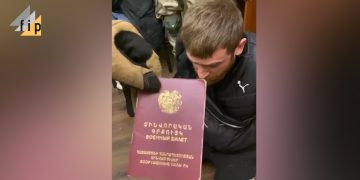On October 25, Armenian Time daily newspaper, referring to its sources, reported that Konstantin Zatulin, deputy of the Russian State Duma, Chairman of the Committee on CIS Affairs, Eurasian Integration and Relations with Compatriots, was banned from entering Armenia.
“Zatulin is considered an unwelcome person in Armenia from now on,” the daily newspaper wrote.
This information was also confirmed by Zatulin himself, in his Telegram channel, publishing attached the letter received in the name of the head of the NA External Relations Department, Tigran Seyranyan, stating that he is considered a persona non grata.
The next day, on October 26, Margarita Simonyan, head of the Russia Today agency, informed on her telegram channel that her entry to Armenia was also banned.
In view of this information, Fact Investigation Platform decided to find out who else was considered unwelcome person in Armenia in different years.
According to the Law on Foreigners, the database of foreigners who are considered unwelcome in the territory of Armenia is maintained by the NSS. The President’s Office, the National Security Service, the police, the Ministry of Foreign Affairs, the Migration Service, as well as in the cases prescribed by law, the courts, and the criminal prosecution bodies too have the right to use the database.
We simultaneously sent an inquiry to the National Security Service, the Ministry of Foreign Affairs and the President’s Office, asking them to provide the list of unwelcome persons since although the database is maintained by the National Security Service, they are not classified.
It’s not mine, I can’t give it
In response to our inquiry, the President’s Office stated that although they have access to the database of unwelcome persons, they are not the ones in charge of the information, but it is the NSS, therefore, the President’s Office cannot provide that list.
Meanwhile, the Law on Freedom of Information stipulates that state and local self-governing bodies, state institutions, organizations funded by state budgets that possess information, as well as public organizations and their officials are considered to be in charge of information.
In other words, contrary to the claims of the President’s Office that they are not in charge of the requested information, the law stipulates that if the latter possess that information, they are considered to be in charge of it.
Personal data according to MFA
The Ministry of Foreign Affairs first requested an additional 30-day period to respond to the inquiry, citing “the need to do additional work.” Afterwards it refused to provide information on the grounds of personal data protection.
According to it, the personal data of unwelcome persons is protected by the Law on Protection of Personal Data, therefore, they cannot be provided without the consent of the entity.
Personal or family privacy according to NSS
The NSS also refused to provide the requested information. In this case, the state agency cited as a justification for the refusal Article 8(1) (2) of the Law on Freedom of Information, according to which the provision of information is refused if it violates the privacy of a person’s personal and family life, including confidentiality of correspondence, telephone conversations, postal, telegraphic and other communications.
In other words, according to the NSS, providing the list of unwanted persons will violate the privacy of the personal and family life of the persons contained in them.
Thus, government agencies with access to the list of unwelcome persons avoid providing the list to FIP.am with various questionable justifications.
It should be added that Fact Investigation Platform has appealed the decision to refuse the provision of information regarding which additional information will be provided.
Sevada Ghazaryan

 FACTOMETER
FACTOMETER










